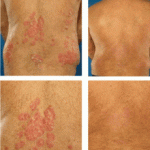Psoriasis is a disease that affect both sexes and all age groups. It has something to do with the malfunction of the body’s immune system resulting to the proliferation and abnormal maturation of the outer cells on the outer layer of the skin that is accompanied by inflammation and abnormalities of the blood vessels.
Researchers have identified the genes that are link to the disease. It is not infectious and therefore psoriasis is not a contagious skin disease.
The skin lesions that characterize psoriasis consisted of red and well demarcated patches that are covered by silvery scales. They can occur at any parts of the body. Occasionally, the nails are also affected, they thicken and deform.
Generally, psoriasis affects only the skin although sometimes it complicates and produces swelling and pain in some joints (psoriatic arthritis)
The area of the skin when affected by psoriasis can vary from a few small spots to nearly complete body coverage. No signs of accompanying symptoms if when the covered area is small except for occasional itchiness and soreness.
If its extensive area that is covered, it is invariably accompanied by itchiness, tenderness and even bleeding. In any case the physical discomforts associated with psoriasis are generally tolerable, but the skin rashes are unsightly and often cause embarrassment and psychological distress to sufferers .
Psoriasis can be precipitated by intake of drugs like lithium and beta blockers (use in hypertension), stress, alcohol, injury, upper respiratory tract infection, but some occur without any precipitating cause.
Sunburn also exacerbates psoriasis although moderate exposure to the sun is beneficial. There is no cure yet for psoriasis but there are a variety treatment regimens currently available to alleviate the active skin lesions but none is consistently effective in inducing long term solution.
